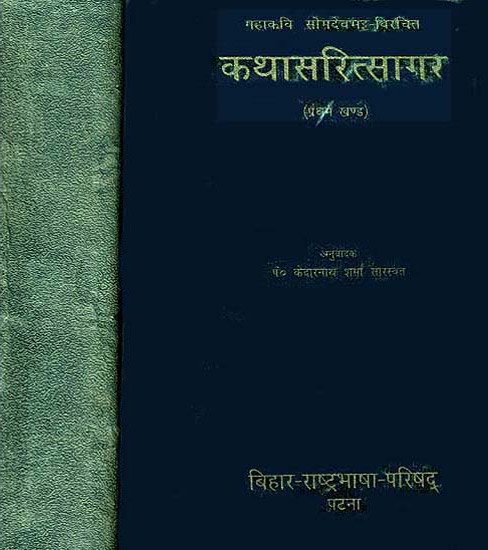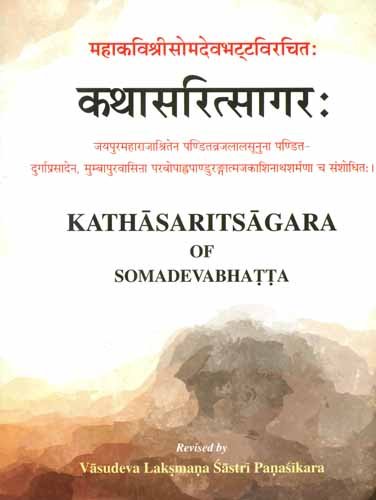Kathasaritsagara [sanskrit]
by C. H. Tawney | 2014 | 226,424 words | ISBN-13: 9789350501351
The Sanskrit edition of the Kathasaritsagara referencing the English translation and grammatical analysis. Written by Somadeva and dating from the 12th century, the Kathasaritsagara (or Katha-sarit-sagara) represents an epic legend narrating the adventures of Naravahanadatta as he strives to become the destined emperor of the Vidyadharas. Alternative titles: (Kathāsaritsāgara, कथासरित्सागर, Kathā-sarit-sāgara)
Verse 8.5.137
तच् छ्रुत्वा श्रुतशर्मणो ऽत्र सुतराम् उद्वेगभाजो व्यधाद् आश्वासं किल दूत्यया शतमखः संप्रेष्य विश्वावसुम् ।
धीरस् त्वं भव सर्वदेवसहितः प्रातः करिष्यामि ते साहाय्यं रणमूर्धनीति धृतिकृत् संदेश्य तत्स्नेहतः ॥ १३७ ॥
tac chrutvā śrutaśarmaṇo 'tra sutarām udvegabhājo vyadhād āśvāsaṃ kila dūtyayā śatamakhaḥ saṃpreṣya viśvāvasum |
dhīras tvaṃ bhava sarvadevasahitaḥ prātaḥ kariṣyāmi te sāhāyyaṃ raṇamūrdhanīti dhṛtikṛt saṃdeśya tatsnehataḥ || 137 ||
The English translation of Kathasaritsagara Verse 8.5.137 is contained in the book The Ocean of Story by C.H. Tawney. This book is available online or you could buy the latest edition:
Read online Buy now! The English translation by C.H. Tawney (2014)
Glossary of Sanskrit terms
Note: This extracts Sanskrit terms and links to English definitions from the glossary, based on an experimental segmentation of verse (8.5.137). Some terms could be superfluous while some might not be mentioned. Click on the word to show English definitions.
Shrutasharman, Atra, Sutaram, Sutara, Udvega, Bhaj, Vyadha, Ashvasa, Kila, Duti, Dutya, Aya, Shatamakha, Preshya, Vishvavasu, Dhira, Tva, Yushmad, Bhava, Sarvadeva, Sahitri, Sahita, Prata, Prat, Tad, Sahayya, Ranamurdhan, Iti, Dhrit, Dhriti, Krit, Sandeshya, Tat, Snehat,
Analysis of Sanskrit grammar
Note: this is an experimental feature and only shows the first possible analysis of the Sanskrit text (Kathasaritsagara Verse 8.5.137). If the system was successful in segmenting the sentence, you will see of which words it is made up of, generally consisting of Nouns, Pronouns, Verbs, Participles and Indeclinables. Click on the link to show all possible derivations of the word.
- Line 1: “tac chrutvā śrutaśarmaṇo 'tra sutarām udvegabhājo vyadhād āśvāsaṃ kila dūtyayā śatamakhaḥ saṃpreṣya viśvāvasum ”
- tac -
-
- Cannot analyse chrutvā*śr
- śrutaśarmaṇo' -
-
śrutaśarman (noun, masculine)[accusative plural], [ablative single], [genitive single]
- atra -
-
atra (indeclinable adverb)[indeclinable adverb]atra (noun, masculine)[compound], [vocative single]atra (noun, neuter)[compound], [vocative single]
- sutarām -
-
sutarām (indeclinable)[indeclinable]sutarā (noun, feminine)[accusative single]
- udvega -
-
udvega (noun, masculine)[compound], [vocative single]udvega (noun, neuter)[compound], [vocative single]
- bhājo* -
-
bhāj (noun, masculine)[nominative plural], [vocative plural], [accusative plural], [ablative single], [genitive single]bhāj (noun, neuter)[ablative single], [genitive single]
- vyadhād -
-
vyadha (noun, masculine)[adverb], [ablative single]
- āśvāsam -
-
āśvāsa (noun, masculine)[adverb], [accusative single]
- kila -
-
kila (indeclinable particle)[indeclinable particle]kila (noun, masculine)[compound], [vocative single]√kil (verb class 6)[imperative active second single]
- dūtya -
-
dūtī (noun, feminine)[compound], [adverb], [nominative single], [vocative single]dūtya (noun, neuter)[compound], [vocative single]
- ayā -
-
ayā (indeclinable)[indeclinable]ā (noun, feminine)[instrumental single]e (noun, masculine)[instrumental single]
- śatamakhaḥ -
-
śatamakha (noun, masculine)[nominative single]
- sam -
-
sa (noun, neuter)[adverb], [nominative single], [accusative single]sam (Preverb)[Preverb]
- preṣya -
-
preṣya (noun, masculine)[compound], [vocative single]preṣya (noun, neuter)[compound], [vocative single]√preṣ -> preṣya (absolutive)[absolutive from √preṣ]√preṣ -> preṣya (participle, masculine)[vocative single from √preṣ class 1 verb]√preṣ -> preṣya (participle, neuter)[vocative single from √preṣ class 1 verb]
- viśvāvasum -
-
viśvāvasu (noun, masculine)[accusative single]viśvāvasu (noun, feminine)[accusative single]
- Line 2: “dhīras tvaṃ bhava sarvadevasahitaḥ prātaḥ kariṣyāmi te sāhāyyaṃ raṇamūrdhanīti dhṛtikṛt saṃdeśya tatsnehataḥ ”
- dhīras -
-
dhīra (noun, masculine)[nominative single]
- tvam -
-
tva (noun, neuter)[adverb], [nominative single], [accusative single]tva (noun, masculine)[accusative single]yuṣmad (pronoun, none)[nominative single]
- bhava -
-
bhava (noun, masculine)[compound], [vocative single]bhava (noun, neuter)[compound], [vocative single]√bhū (verb class 1)[imperative active second single]
- sarvadeva -
-
sarvadeva (noun, masculine)[compound], [vocative single]
- sahitaḥ -
-
sahitṛ (noun, masculine)[vocative single]sahita (noun, masculine)[nominative single]√sah -> sahita (participle, masculine)[nominative single from √sah class 1 verb], [nominative single from √sah class 10 verb]
- prātaḥ -
-
prāta (noun, masculine)[nominative single]√prā -> prāt (participle, masculine)[accusative plural from √prā class 2 verb], [ablative single from √prā class 2 verb], [genitive single from √prā class 2 verb]√prā -> prāt (participle, neuter)[ablative single from √prā class 2 verb], [genitive single from √prā class 2 verb]√prā (verb class 2)[present active third dual]
- kariṣyāmi -
-
√kṛ (verb class 1)[future active first single]√kṛ (verb class 2)[future active first single]√kṛ (verb class 5)[future active first single]√kṛ (verb class 8)[future active first single]√kṛ (verb class 3)[future active first single]√kṛ (verb class 6)[future active first single]√kṝ (verb class 5)[future active first single]√kṝ (verb class 9)[future active first single]
- te -
-
ta (noun, masculine)[locative single]ta (noun, neuter)[nominative dual], [vocative dual], [accusative dual], [locative single]tā (noun, feminine)[nominative dual], [vocative single], [vocative dual], [accusative dual]tad (noun, neuter)[nominative dual], [accusative dual]sa (noun, masculine)[nominative plural]sā (noun, feminine)[nominative dual], [accusative dual]yuṣmad (pronoun, none)[dative single], [genitive single]
- sāhāyyam -
-
sāhāyya (noun, neuter)[adverb], [nominative single], [accusative single]
- raṇamūrdhanī -
-
raṇamūrdhan (noun, masculine)[locative single]
- iti -
-
iti (indeclinable particle)[indeclinable particle]iti (noun, feminine)[compound], [adverb]
- dhṛti -
-
dhṛti (noun, feminine)[compound], [adverb]dhṛti (noun, masculine)[compound], [adverb]dhṛtī (noun, masculine)[adverb]dhṛtī (noun, feminine)[compound], [adverb], [vocative single]dhṛtī (noun, neuter)[compound], [adverb], [nominative single], [vocative single], [accusative single]dhṛt (noun, masculine)[locative single]dhṛt (noun, neuter)[locative single]
- kṛt -
-
kṛt (noun, masculine)[compound], [adverb], [nominative single], [vocative single]kṛt (noun, neuter)[compound], [adverb], [nominative single], [vocative single], [accusative single]
- sandeśya -
-
sandeśya (noun, masculine)[compound], [vocative single]sandeśya (noun, neuter)[compound], [vocative single]
- tat -
-
tat (indeclinable correlative)[indeclinable correlative]tad (noun, neuter)[compound], [nominative single], [accusative single]
- snehataḥ -
-
√snih -> snehat (participle, masculine)[accusative plural from √snih class 1 verb], [ablative single from √snih class 1 verb], [genitive single from √snih class 1 verb]√snih -> snehat (participle, neuter)[ablative single from √snih class 1 verb], [genitive single from √snih class 1 verb]√snih (verb class 1)[present active third dual]
Other editions:
Also see the following editions of the Sanskrit text or (alternative) English translations of the Kathasaritsagara Verse 8.5.137
Kathasaritsagar
by Kedarnath Sharma Saraswat (2005)
The Only Edition with the Sanskrit Text and its Hindi Translation (An Old and Rare Book) Set of 3 Vol.
Buy now!
Kathasaritsagara of Somadeva Bhatta (Sanskrit Text Only)
by Vasudeva Laksmana Sastri (2013)
Katha Sarit Sagar in Marathi
by H. A Bhave (1995)
Set of 5 Volumes; Published by Varada Books, Pune. 2256 pages (Throughout B/W Illustrations).
Buy now!
Katha Sarit Sagara (Tamil)
by S. V. Ganapati (எஸ். வி. கணபதி) (2014)
[கதா சரித் சாகரம்] Published by Alliance Publications.
Buy now!
Galpa Shono
by Abhijit Chattopadhyay (2014)
[গল্প শোনো] Galpa Shono: Bengali Translation of 'Suno Kahani From Katha Sarit Sagar'; 9788126015436; Published by Sahitya Akademi, Delhi.
Buy now!Preview of verse 8.5.137 in Bengali sript:
তচ্ ছ্রুত্বা শ্রুতশর্মণো ঽত্র সুতরাম্ উদ্বেগভাজো ব্যধাদ্ আশ্বাসং কিল দূত্যযা শতমখঃ সংপ্রেষ্য বিশ্বাবসুম্ ।
ধীরস্ ত্বং ভব সর্বদেবসহিতঃ প্রাতঃ করিষ্যামি তে সাহায্যং রণমূর্ধনীতি ধৃতিকৃত্ সংদেশ্য তত্স্নেহতঃ ॥ ১৩৭ ॥
![Kathasaritsagara [sanskrit] - book cover](/uploads/a/Katha-Sarit-Sagara.jpg)




